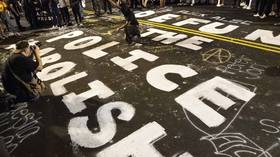UK, France & Germany criticize Iran’s uranium enrichment despite nuclear deal falling apart due to US withdrawal & sanctions
London, Berlin and Paris have once again expressed their concerns over Iran’s continued uranium enrichment to ever higher levels. Such action would make a return to the nuclear deal “more difficult,” the three nations say.
Iran’s actions amount to a “serious breach” of Tehran’s obligations under the 2015 nuclear deal also known as the Joint Comprehensive Plan of Action, or JCPOA, the nations said in a joint statement published on Thursday.
The damning statement came two days after the International Atomic Energy Agency (IAEA) informed its member states that Iran was now using two cascades at its enrichment plant at Natanz to enrich uranium up to 60% purity.
Also on rt.com ‘For medical & humanitarian reasons only’: Tehran hits back after London, Paris & Berlin voice ‘concerns’ over 20% enrichmentIn April, Iran announced for the first time it would enrich uranium to the 60% level. The announcement came after an alleged Israeli attack on its Natanz nuclear facility. At that time, only one cascade of centrifuges was used for such purposes.
In July, Tehran told the IAEA it was enriching uranium metal to 20% at its Tehran Research Reactor. At that time, Iran said this enrichment was needed for “peaceful, medicinal and humanitarian uses.”
Now, the UK, France and Germany argue that enrichment to both 20% and 60% levels of purity are “crucial steps in the development of a nuclear weapon,” adding that “Iran has no credible civilian need for these measures.”
The three nations also said they were concerned by the fact that Tehran limited the IAEA’s capability to inspect its nuclear facilities in comparison to the powers granted to the agency under the JCPOA. London, Berlin and Paris demanded Tehran cease all activities that violate the deal “immediately.”
Iran has repeatedly brushed off such demands from the Western nations, pointing to the fact that it was they who never fulfilled their own obligations under the deal. In July, Iran’s Foreign Ministry spokesman Saeed Khatibzadeh accused the three nations of caving in to US pressure instead of defending the agreement.
Iran began breaching the terms of the 2015 nuclear deal after then-US President Donald Trump unilaterally withdrew from it in 2018 and reintroduced US sanctions against Iran. He also later slapped the country with additional sanctions.
Also on rt.com Rouhani says Iran can enrich uranium to 90%, equivalent to weapons-gradeTehran then repeatedly stated it was ready to return to the deal as soon as the US sanctions are lifted. So far, Iran has continued to enrich uranium to levels vastly surpassing the agreed 3.67% level.
In July, Iran’s then-President Hassan Rouhani said that the authorities deemed it necessary to enrich uranium to 90% purity as they were exploring the possibilities of a national nuclear program, no longer bound by the 2015 deal’s constraints.
The 90% figure quoted by Rouhani is considered the minimum benchmark for the production of nuclear weapons.
London, Paris and Berlin have described the situation as particularly worrying, since the talks in Vienna, which were designed to make all sides – including the US and Iran – return to the deal, have been halted for months “at Tehran’s request” and Iran has so far not agreed to any date for their resumption. Tehran’s actions amid the stalled negotiations make a potential revival of the deal increasingly more difficult, the Thursday statement said.
On Tuesday, Khatibzadeh once again stated that Iran is ready to fulfill its commitments and stop what Iran calls “compensatory measures,” but no sooner than other parties do the same.“If the other parties return to their obligations under the nuclear accord and Washington fully and verifiably lifts its unilateral and illegal sanctions... all of Iran's mitigation and countermeasures will be reversible,” he said.
Also on rt.com Blinken says nuclear deal negotiations with Iran ‘cannot go on indefinitely’ as indirect talks dragThink your friends would be interested? Share this story!














